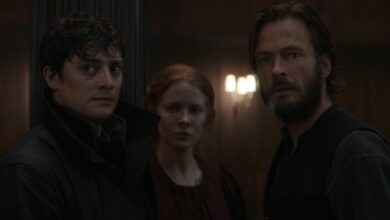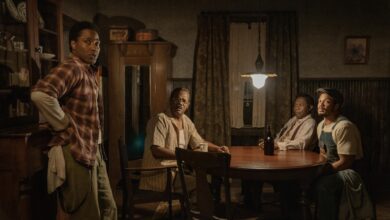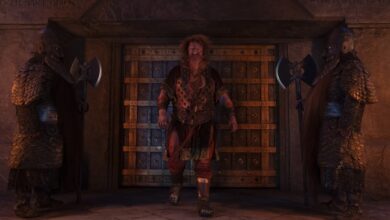The Rings of Power: Sauron’s Identity Revealed! Episode 8 Allies Has Confirmed The Identity Of Sauron
Episode 8 of The Rings of Power, Allies, has confirmed the identity of Sauron, the great mystery of the series for some viewers and an open secret for others.
The Rings of Power Episode 8, Allies, has finally revealed the identity of Sauron. As viewers had been suspecting, many of them were encouraged by a popular leak that advanced the plot of the series three months ago in a popular forum, Halbrand (Charlie Vickers) is Sauron and Sauron is Halbrand. The few doubts that fans could have were confirmed in the previous episode when Halbrand survives against all odds to a mortal wound, and it turns out that only he can save him, according to Galadriel, elven medicine. Where is the cure? In Eregion. Where did Sauron want to go? To Eregion. Where was Sauron infiltrating the books? In Eregion. It was reasonably clear. Contrary to this assumption were JRR Tolkien’s books where there was neither Halbrand nor Sauron came in the form of a (stick) king from the Southlands to the Eregion. But the series has already made it clear that it takes advantage of any open gap in history to reimagine it. To us, the truth is we liked Halbrand more as king of the dead, but we were left with the desire.
The Rings of Power: Sauron’s Identity Revealed!
The series has cleverly played Sauron’s hand, leaving clues to Halbrand’s identity throughout the episodes. “What’s your name?” Halbrand asks her when he rescues her from the sea in episode 1 of The Rings of Power. “Galadriel,” she replies reluctantly. “I’m Halbrand,” Charlie Vickers’ character replies. He then says, “What is our destination?” Some viewers have been running to watch this scene again for clues. Halbrand’s eyepieces and they want to see the intent in Vickers’ performance. And the truth is that there was little intent there. Vickers has not revealed the identity of his character until after shooting the first two episodes. Although in the auditions he was made to play Richard III’s monologue in which he’s a villain, and even though he also had to defend Milton’s Paradise Lost, where he played Satan, he didn’t know his character was Sauron or at least had a reasonable doubt.

Vickers knew that her character had a dark side (otherwise the auditions were meaningless), but she didn’t know it until after the series went on hiatus due to the pandemic. They shot the first two episodes and the series stopped filming. “Just before we started shooting the third episode, they told me: There’s something else about your character. You’re playing Sauron”, Vickers told after the premiere of chapter 8. Only Morfydd Clark, who plays Galadriel, knew because she was his scene partner. That’s an interesting thing about Halbrand, that you only see him through the eyes of other characters. They play a very important role in how the public sees him and how the public sees Sauron. So Morfydd knew, but no one else knew. I’ve been keeping it a secret this whole time,” Vickers explained in an interview with Entertainment Weekly.
Fans of the original novels have criticized from the beginning the possibility that Halbrand was Sauron for a very specific reason: Sauron is a manipulator with a plan in his head and there is no redemption arc, no repentance in his actions, something that is inherent in Halbrand’s revelation as Sauron. “When Morgoth was defeated, it was as if a clenched fist had snapped my neck free, and in the stillness of that dawn, I felt the light of the one again. And I knew that if I ever wanted to be forgiven, I had to heal all that had helped destroy, Vickers’ character tells Galadriel in the scene where he reveals his identity. It is at this moment that Clark’s character replies forcefully: “No punishment could ever erase the evil you have done.” And Halbrand continues: ” you told me. After our victory, you told me that, despite what you had done before, I could free myself. I told you the truth, I told you I had done wrong, and you didn’t care because you knew our past meant nothing compared to our future.” Galadriel replies, “There is no such future.” “There is not?” she asks Sauron.
From here the spectators are divided. Some appreciate this revelation and understand that the darkness that Galadriel has approached has to do with the character they know from the Peter Jackson movies and ‘buy’ Halbrand’s repentance = Sauron and those who consider all this anathema. Vickers insists that the theme of regret is in Tolkien’s novels. “It’s interesting because Tolkien speaks of Sauron as repentant. He clearly says that he is repentant and that he is ashamed. He says that in The Silmarillion, and he says that in some notes in The Ring of Morgoth Ring. But he always puts the words ‘for fear’ right after “repentance.” I think fear can lead to genuine regret, and I think he fears gods and fears punishment. He kneels before Eönwë and is humble and lowered. So, I think Halbrand is an example of him at this repentant stage,” Vickers said in the interview.
“There are some very interesting letters from Tolkien. There is letter 131 [that’s the one he sent to his publisher, in which he summarized the plot of The Hobbit, The Silmarillion and The Lord of the Rings], where he talks about repentance, and you can see Tolkien’s perspective on what he wanted Sauron to be. Despite this regret, he wants Sauron to be considered very terrible. That is important. You must remember that he is evil. He is the epitome of evil. Tolkien talks about how he stays in Middle Earth, and very slowly, he reforms. I think that’s there in Halbrand. You see the persistence of this evil, and you see Halbrand slowly reforming from someone who has been humiliated and is at the lowest of the low, floating on a raft in the sea, to being the king of the Southlands. You see the building blocks and how everything resurfaced, and that completely lines up with what Tolkien said. And then there are other stories in The Silmarillion and Beren and Luthien. Sauron’s journey is fascinating.”
“Whether you believe it or you don’t see that regret as genuine, it colors his actions of the season completely. You can look back at his actions, and they can be genuine regret and make perfect sense. But if you look at it like he’s manipulating everything and using Galadriel to bring him back… Of course, some coincidences happen along the way, that play into his hands. But he’s capable of manipulating people.”
Vickers has also rejected that there is any kind of romance between the two. “I think when he introduces himself to her in the final episode, he makes a very clear proposition to her. She tells him, “Let’s do this. You can be the queen, and I’ll be the king.” I don’t think it’s out of love at all. It is not a statement. It is based on her benefit. He believes that he can rule more effectively with her by her side. And if she says no, it’s by no means the end of the world. I think it’s evil, and it’s terrible. Whether or not she is by her side, he will find a way to do it. But right now, he’s going to be more effective with her there,” says Vickers.
Source (Esquire)






